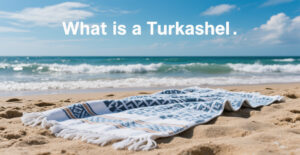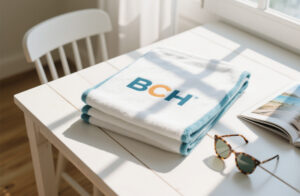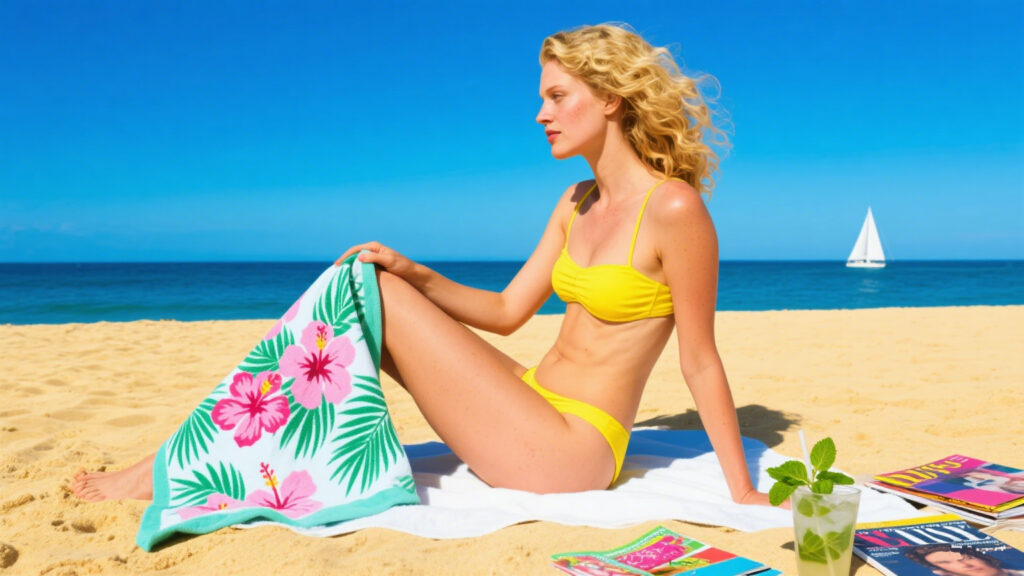
When it comes to choosing the perfect beach towel, size isn’t the only factor to consider. Other elements like GSM (grams per square meter), weight, material, and overall quality play a crucial role in ensuring a great beach experience. This guide will walk you through all the key aspects to consider when selecting a beach towel that meets your needs.
How the GSM of a Beach Towel Affects Its Quality and Performance
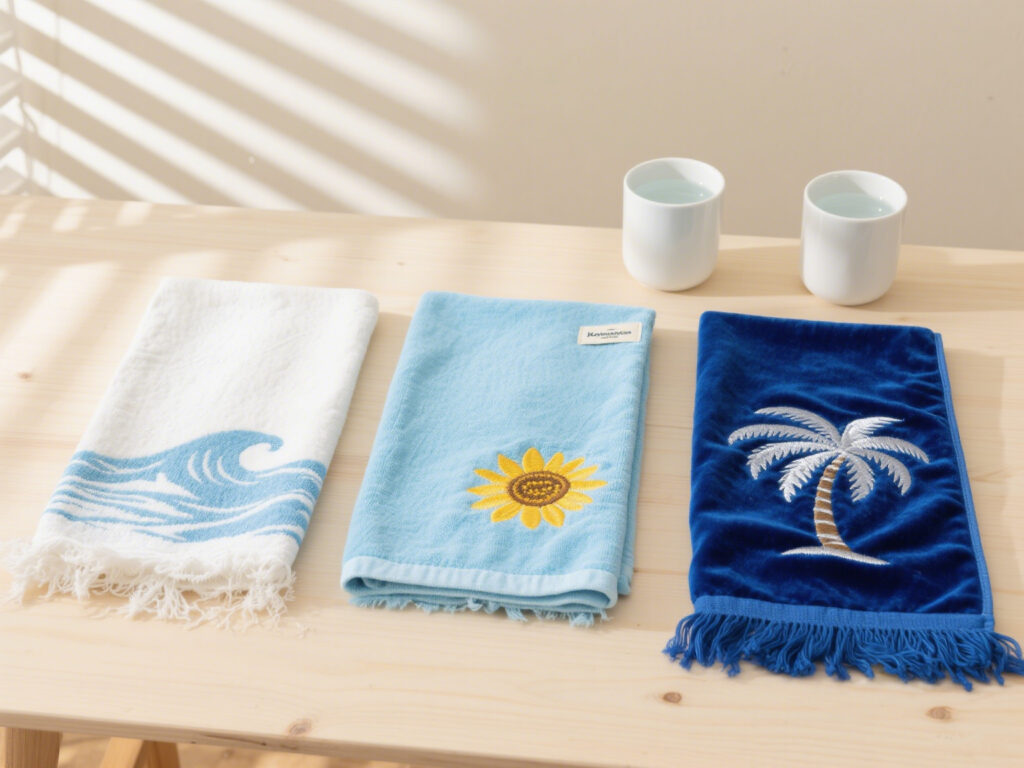
The GSM of a beach towel is a critical factor that impacts its absorbency, softness, and durability. GSM refers to the weight of the towel’s fabric per square meter, directly influencing how the towel feels and performs.
The Role of GSM in Absorbency and SoftnessGSM
Higher GSM towels tend to be more absorbent and softer, providing a more luxurious feel against the skin. Towels with a GSM of around 400–600 are considered premium for their superior absorbency and plush texture. These towels absorb water efficiently, making them ideal for drying off quickly after a swim.
How GSM Impacts Durability and LongevityGSM
Towels with higher GSM also tend to last longer. The denser weave makes them more durable and less prone to wear and tear. While they may take longer to dry, their resilience ensures that they maintain their shape and quality after multiple washes.
Choosing the Right GSM for Your Beach Towel
A higher GSM means a denser fabric with more fibers packed into each square meter, allowing the towel to absorb more moisture. Towels with a GSM of 400-600 are typically very absorbent, making them perfect for drying off after a swim. On the other hand, towels with a lower GSM (200-400) might absorb moisture less effectively, though they may still be adequate for casual use.
- Low GSM (200–400): Lightweight, quick-drying, and best for travel or casual use.
- Medium GSM (400–500): A good balance of absorbency and durability for regular beachgoers.
- High GSM (500–700): Ideal for luxury, comfort, and plush absorbency.
The choice of GSM depends on your personal preference for comfort, absorbency, and practicality. If you want a towel for lounging in comfort, opt for a higher GSM. If you need something light and fast-drying for travel or frequent use, lower GSM might be the better option.
How the Weight of a Beach Towel Affects Its Quality and Performance
The weight of a towel correlates with its GSM but also affects how it handles moisture, comfort, and durability. A towel’s weight is an essential factor to consider for both performance and convenience.
The Role of Weight in Absorbency and Comfort
Heavier towels generally provide greater absorbency due to their increased density, but they can feel bulky and cumbersome. Lighter towels, on the other hand, are easier to handle and more portable, but they may lack the plush comfort of heavier towels.
Heavier Towels vs Lighter Towels: Which Is Better for You?
When choosing between heavier and lighter beach towels, the decision ultimately depends on your preferences and how you intend to use the towel. Both types come with their distinct advantages and drawbacks.
Heavier Towels:
- Pros: Heavier towels typically offer greater absorbency. They are denser, which means they can soak up more water, making them ideal for those who need to dry off quickly after swimming. They also tend to feel more luxurious and soft against the skin, providing a plush experience. Heavier towels are often more durable and long-lasting due to the extra weight and dense fabric, making them perfect for frequent beachgoers who need a reliable, comfortable towel.
- Cons: The main downside to heavier towels is their bulk. They take up more space in your bag and are more cumbersome to carry around. Additionally, they take longer to dry, which can be a concern if you’re heading out for multiple beach activities or traveling with limited storage space.
Lighter Towels:
- Pros: Lighter towels excel in portability and drying speed. They are easy to pack, taking up minimal space in your bag or suitcase, making them great for travelers or people who like to pack light. Lighter towels also dry much faster, which is a big advantage if you need to reuse your towel during the day. Microfiber towels, for example, are incredibly lightweight and dry extremely quickly while still offering decent absorbency.
- Cons: The downside to lighter towels is that they may not be as absorbent as their heavier counterparts. Since they are thinner and less dense, they might not dry you off as effectively after swimming. While they do offer convenience, they can feel less luxurious and might lack the soft, plush experience that heavier towels provide.
How Weight Impacts Durability and Drying Speed
Heavier towels generally take longer to dry but last longer due to their dense material. Lighter towels dry quickly, making them suitable for those who need to pack light or use a towel multiple times during the day.
Material Matters: The Best Fabrics for Beach Towels
The material of a beach towel significantly impacts its softness, absorbency, and longevity. Choosing the right fabric is essential for getting the most out of your towel.
Cotton: The Classic Choice for Comfort and Absorbency
Cotton is the most popular material for beach towels due to its natural softness and high absorbency. It feels comfortable against the skin and dries well in warm weather, making it ideal for beach trips.
Microfiber: The Lightweight, Quick-Drying Option
Microfiber towels are lightweight and quick-drying, making them perfect for travelers or those who need a towel that can dry off quickly. While they may not be as soft as cotton, they are highly efficient in absorbing moisture and drying fast.
Bamboo and Organic Materials: Eco-Friendly Alternatives
For eco-conscious buyers, bamboo and organic cotton towels offer a sustainable option. Bamboo towels are naturally antibacterial, while organic cotton avoids harmful chemicals, making them gentler on the skin and the environment.
The Pros and Cons of Different Fabrics for Beach Towels
- Cotton: Soft, absorbent, but takes longer to dry.
- Microfiber: Quick-drying, lightweight, but less plush.
- Bamboo: Sustainable, antibacterial, but may be less durable than cotton.
- Organic Cotton: Eco-friendly and soft, but may come at a higher price.
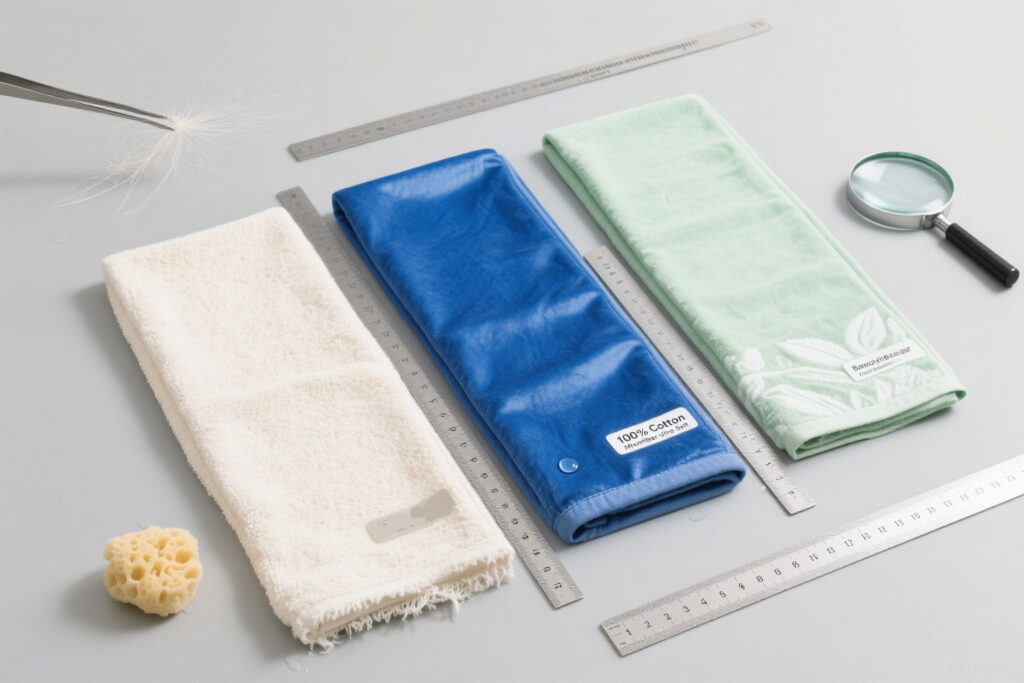
How to Choose the Right Beach Towel for Your Needs
Choosing the right beach towel involves considering several factors to ensure it meets your needs for comfort, absorbency, durability, and convenience. Here’s a guide to help you make the best choice:
Key Factors to Consider When Buying a Beach Towel
- Size: Make sure the towel is large enough for comfort but not too bulky to carry.
- GSM: Consider your preference for softness, absorbency, and durability when choosing the GSM.
- Material: Decide based on your need for comfort (cotton), speed (microfiber), or eco-friendliness (bamboo or organic cotton).
Choosing a Beach Towel Based on Material, Weight, and Size
- For Ultimate Comfort: Opt for a high GSM cotton towel.
- For Portability and Quick Drying: Choose a microfiber towel with a low to medium GSM.
- For Eco-Friendliness: Bamboo or organic cotton are great alternatives.
Additional Tips for Maintaining Your Beach Towel
- Always wash beach towels in cold water to preserve their color and softness.
- Avoid using fabric softeners as they can reduce the towel’s absorbency.
- Dry towels properly, preferably in the sun, to maintain their freshness and prevent odors.
Conclusion
To choose the right beach towel, consider size, material, GSM, and drying speed based on your needs. If comfort and absorbency are your priorities, go for a higher GSM cotton towel. For portability and quick drying, microfiber is a great option. Additionally, eco-friendly materials like bamboo or organic cotton are perfect for those looking for sustainable choices. By considering these factors, you can find the perfect beach towel to enhance your beach experience.
Conclusion: Selecting the Ideal Beach Towel for Comfort, Durability, and Performance

Choosing the right beach towel is essential for a comfortable and efficient beach day. Consider the GSM, weight, and material when making your decision to ensure the towel meets your needs. Whether you prioritize absorbency, quick drying, or eco-friendliness, understanding these factors will help you select a towel that will provide long-lasting comfort and performance.
This structure keeps the content professional, concise, and logical while covering all necessary aspects of beach towel selection. Let me know if you need further details on any section!
Their beach towel products are the best: bchtowel
What is the size of a typical beach towel?
A typical beach towel is usually around 27 to 30 inches wide and 60 to 70 inches long.
Standard towels are typically 20 by 40 inches in size, commonly used for drying hands or face.
Beach towels are generally larger (27–30 inches x 60–70 inches) for extra coverage, while pool towels may be smaller, typically around 24–30 inches x 50–60 inches.
No, a bath sheet is larger, typically around 35 by 60 inches or more, while a beach towel is a bit smaller but still offers plenty of coverage.
A beach towel should generally be at least 60 to 70 inches long to provide full coverage when lounging or drying off.
